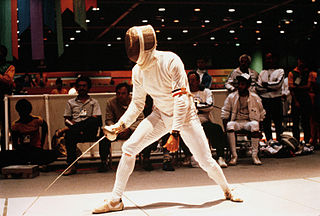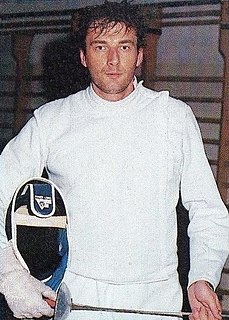
Repechage is a practice in series competitions that allows participants who failed to meet qualifying standards by a small margin to continue to the next round. A well known example is the wild card system.

The open category was a judo event held as part of the Judo at the 1964 Summer Olympics programme. The weight class allowed judokas of any weight. The competition was held on Friday, October 23, 1964.

The men's sprint at the 1976 Summer Olympics in Montreal, Canada, was held from 21 to 24 July 1976. There were 25 participants from 25 nations. Following the explosion in size of the event from 1960 to 1972 when nations were allowed two cyclists each, the limit was again reduced to one competitor from each nation. The event was won by Anton Tkáč of Czechoslovakia, the nation's first medal in the men's sprint. Tkáč beat two-time defending champion Daniel Morelon of France in the final; Morelon's silver was a (still-standing record fourth medal in the event. Jürgen Geschke earned bronze to give East Germany its first medal in the event and the first medal for any German cyclist since 1952.
Women's 70 kg competition in judo at the 2004 Summer Olympics was held on August 18 at the Ano Liossia Olympic Hall.

The amateur foil competition had 54 fencers from 10 nations compete. There was no limit on the number of fencers per nation; 39 of the 54 competitors were French. For the first round, quarterfinals, and repechage, skill and art with the foil was more important to advancing than winning the bout. The event was swept by French fencers: Émile Coste, Henri Masson, and Marcel Boulenger took the top three places. It was the second consecutive Games that France had taken the top two ranks
Men's 90 kg competition in judo at the 2000 Summer Olympics was held on 20 September at the Sydney Convention and Exhibition Centre.
Men's +100 kg competition in judo at the 2000 Summer Olympics was held on 22 September at the Sydney Convention and Exhibition Centre.

The men's épée was one of eight fencing events on the fencing at the 1976 Summer Olympics programme. It was the seventeenth appearance of the event. The competition was held from July 22 to 23 1976. 64 fencers from 26 nations competed. Each nation was limited to 3 fencers. The event came down to a three-way barrage among the medalists, with two West German fencers joining Győző Kulcsár of Hungary in this tie-breaker fencing session. Alexander Pusch won against both opponents in the barrage to take gold, with Hans-Jürgen Hehn defeating Kulcsár for silver. The medals were the first for West Germany in the men's individual épée. Kulcsár's bronze made him the second man to earn three medals in the event.

The men's épée was one of eight fencing events on the fencing at the 1980 Summer Olympics programme. It was the eighteenth appearance of the event. The competition was held from 27 to 28 July 1980. 42 fencers from 16 nations competed. Each nation was limited to 3 fencers. The event was won by Johan Harmenberg of Sweden, the nation's first victory in the event and first medal of any color in the men's individual épée since 1924. Silver went to Ernő Kolczonay of Hungary, extending the nation's podium streak to four Games despite the retirement of three-time medalist Győző Kulcsár. Philippe Riboud of France took bronze. Sweden's Rolf Edling, a two-time World Champion, made his third final in the event, but once again missed the podium.

The men's épée was one of eight fencing events on the fencing at the 1984 Summer Olympics programme. It was the nineteenth appearance of the event. The competition was held from August 7 to 8 1984. 63 fencers from 26 nations competed. Each nation was limited to 3 fencers. The event was won by Philippe Boisse of France, the nation's first victory in the men's individual épée since 1928 and fourth overall. France also took bronze, with Philippe Riboud winning the bronze medal match after losing to Boisse in the semifinals. It was Riboud's second consecutive bronze medal in the event, making him the 10th man to earn multiple medals in the individual épée. Silver went to Björne Väggö of Sweden. Hungary's four-Games podium streak in the event ended due to that nation joining the Soviet-led boycott.

The men's foil was one of eight fencing events on the fencing at the 1984 Summer Olympics programme. It was the nineteenth appearance of the event. The competition was held from 1 to 2 August 1984. 58 fencers from 26 nations competed. Nations had been limited to three fencers each since 1928. The event was won by Mauro Numa of Italy, the nation's sixth victory in the men's foil. His countryman Stefano Cerioni took bronze. The silver medal went to Matthias Behr, West Germany's first medal in the event and the first medal for any German athlete since 1928. France's five-Games podium streak ended.

The men's sabre was one of eight fencing events on the fencing at the 1984 Summer Olympics programme. It was the twentieth appearance of the event. The competition was held from August 3 to 4, 1984. 33 fencers from 16 nations competed. Nations had been limited to three fencers each since 1928. The event was won by Jean-François Lamour of France, the nation's first victory in the event since 1900. Marco Marin of Italy took silver and Peter Westbrook of the United States took bronze. It was the first medal in the event in many Games for each of the three nations since 1964 for France, since 1960 for Italy, and since 1904 for the United States), as the men's sabre competitions had been dominated by Hungary and the Soviet Union. With both of those nations boycotting the 1984 Games, other nations had an opportunity to win medals in the sabre.

The men's épée was one of eight fencing events on the fencing at the 1992 Summer Olympics programme. It was the twenty-first appearance of the event. The competition was held on 1 August 1992. 70 fencers from 30 nations competed. Each nation was limited to three fencers. The event was won by Éric Srecki of France, the nation's fifth victory in the event. France also took bronze, with Jean-Michel Henry winning the bronze medal match. France's podium streak in the event extended to four Games. Pavel Kolobkov of the Unified Team took silver.

The men's foil was one of eight fencing events on the fencing at the 1992 Summer Olympics programme. It was the twenty-first appearance of the event. The competition was held on 31 July 1992. 59 fencers from 25 nations competed. Nations had been limited to three fencers each since 1928. The event was won by Philippe Omnès of France, the nation's first victory in the men's foil since 1956 and eighth overall. Serhiy Holubytskiy of the Unified Team took silver. Elvis Gregory earned Cuba's first medal in the event in 88 years with his bronze.

The men's sabre was one of eight fencing events on the fencing at the 1992 Summer Olympics programme. It was the twenty-second appearance of the event. The competition was held on 2 August 1992. 44 fencers from 19 nations competed. Nations had been limited to three fencers each since 1928. The event was won by Bence Szabó of Hungary, the nation's first victory in the men's sabre since 1964 and 12th overall. Marco Marin took silver while Jean-François Lamour finished with the bronze. Lamour, who had won gold in 1984 and 1988, was unable to win a third title but still became only the second man with three medals in the event. Marin had also finished second in 1984; he was the 12th man with multiple medals in the sabre.
Women's 70 kg competition in judo at the 2012 Summer Olympics in London, United Kingdom, took place at ExCeL London.
The men's 63 kg competition in judo at the 1976 Summer Olympics in Montreal was held on 30 July at the Olympic Velodrome. Two single-elimination pools, with winner of each pool advanced to the final. All judoka losing to the winner of each pool advanced to repêchage pools, with the winners of the repêchage pools earning bronze medals.
These are the results of the women's +72 kg competition in judo at the 1996 Summer Olympics in Atlanta, Georgia. A total of 20 women competed in this event, limited to jūdōka whose body weight was more than 72 kilograms. Competition took place on July 20 of 1996 in the Georgia World Congress Center.

The men's coxed four (M4+) competition at the 1976 Summer Olympics took place at the rowing basin on Notre Dame Island in Montreal, Quebec, Canada. It was held from 18 to 25 July and was won by the team from Soviet Union. There were 14 boats from 14 nations, with each nation limited to a single boat in the event. The victory was the Soviet Union's first medal in the men's coxed four. East Germany took its third consecutive silver medal, with entirely different crews each time. The defending champion West Germany received bronze this time. Hans-Johann Färber, the only rower from the 1972 gold medal team to return, became the fifth man to earn multiple medals in the event.
The men's quadruple sculls competition at the 1976 Summer Olympics took place at Notre Dame Island Olympic Basin, Canada. It was the first time that the event was included at the Olympics.












